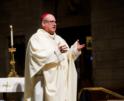
Faith
"Jesus Christ is the face of the Father's mercy. These words might well sum up the mystery of the Christian faith. Mercy has become living and visible in Jesus of Nazareth."
"Let us see your face." The whole church repeats this five-word, heartfelt plea to God four times during Masses on Advent's first Sunday. Heard in the responsorial psalm after the first biblical reading, it echoes this repeated plea to God in Psalm 80:
"Light up your face and we shall be saved."
Does it make sense for the Christian family to beg God at the Advent season's beginning to reveal his face? Doesn't the memory of the one born 2,000 years ago in Bethlehem reveal this -- the one frequently described as God's face in this world?
"Christ is the face of God, which is never darkened," Pope Francis told bishops from around the world in September 2016. When he called in April 2015 for a Year of Mercy throughout the church, he stated emphatically:
"Jesus Christ is the face of the Father's mercy. These words might well sum up the mystery of the Christian faith. Mercy has become living and visible in Jesus of Nazareth."
This, then, is no distant Lord. As the Gospel of John plainly states, the word of God "made his dwelling among us" (1:14).
So God's face is known among Christians. But as Advent gets under way, Christians begin again their quest to see God's face. Does that sound like a contradiction in terms?
During Advent, Christians patiently await the revelation of the face of God at Christmas. Notably, this pursuit prepares them to discover how God is present in their lives and world now.
For the memory of Jesus' birth is a living memory, not the memory of an event confined to the past.
Like the determined Wise Men from the East (Mt 2:1-12), contemporary people of faith set out to find Jesus and discover what his birth portends for them.
Where can the Lord be seen and heard in the 21st century? Pope Francis approaches this as a basic Advent question. He spoke of it at the start of Advent in 2016.
The Lord visits humanity, he said. "We all know" that this "occurred with the incarnation, Jesus' birth in the cave of Bethlehem." But, the pope continued, "the Lord visits us constantly."
Consolingly, he walks "alongside us."
Furthermore, he "will come again in glory to judge the living and the dead." But this faith statement is not meant "to scare us," Pope Francis remarked.
Instead, the purpose is "to open our horizons to another, greater dimension, one which ... puts into perspective everyday things, while at the same time making them precious, crucial."
Pope Francis accented the often "unexpected" form of the Lord's presence. "The relationship with the God-who-comes-to-visit-us" casts a "different light" on everything, he said.
Advent, he added, encompasses a call "to expand" our hearts' horizons. "To do this, we must learn not to depend ... on our own established strategies." Awaiting the Lord means preparing "to let ourselves be visited by him, ... even if it disturbs our plans."
Patiently preparing to welcome the Lord might mean asking probing questions, whether individually, as families or as faith communities, questions like:
Have I been asking the wrong question about someone I consider difficult? What is the right question?
Do we possess hidden gifts that might well benefit us and others? Why do these gifts remain hidden?
St. Joseph is an Advent figure. God unexpectedly disrupted Joseph's life plan.
As the time of Jesus' birth approached, a great question challenged Joseph fiercely. His answer would transform his entire life.
Joseph is a bridge for the church between Advent and Christmas. His story is told in 2017 both during the Dec. 18 Advent Mass and the Christmas vigil Mass.
Near the end of Advent in 2013, Pope Francis highlighted Joseph's predicament. The Gospel of Matthew (1:18-25) tells of "the events preceding the birth of Jesus," presenting them from the perspective of Joseph, "the betrothed of the Virgin Mary," the pope observed.
Joseph and Mary, he continued, "were not yet living together, because they were not yet married. In the meantime, Mary, after having welcomed the angel's announcement, came to be with child by the power of the Holy Spirit."
Joseph "was bewildered."
Trying to do God's will, Joseph made "what for him (was) an enormous sacrifice," the pope explained. The Gospel says that since Joseph "was a righteous man, yet unwilling to expose (Mary) to shame," he "decided to divorce her quietly."
This "reveals a true inner drama" if one thinks of Joseph's love for Mary, said Pope Francis. But God opened up "a different path."
In the Gospel's words, "the angel of the Lord appeared to him in a dream and said, 'Joseph, son of David, do not be afraid to take Mary your wife into your home. For it is through the Holy Spirit that this child has been conceived.'"
Joseph had been "following a good plan for his life," but God reserved "another plan for him, a greater mission," Pope Francis said, adding:
"By accepting himself according to God's design," Joseph fully found himself.
DAVID GIBSON SERVED ON CATHOLIC NEWS SERVICE'S EDITORIAL STAFF FOR 37 YEARS.
Recent articles in the Faith & Family section
-
'A powerful legacy and witness'Archbishop Richard G. Henning
-
The next popeJaymie Stuart Wolfe
-
A pilgrim on the CaminoFather Robert M. O'Grady
-
'To Change the World, We Must Be Good to Those Who Cannot Repay Us'Maureen Crowley Heil
-
Divine Mercy SundayArchbishop Richard G. Henning























